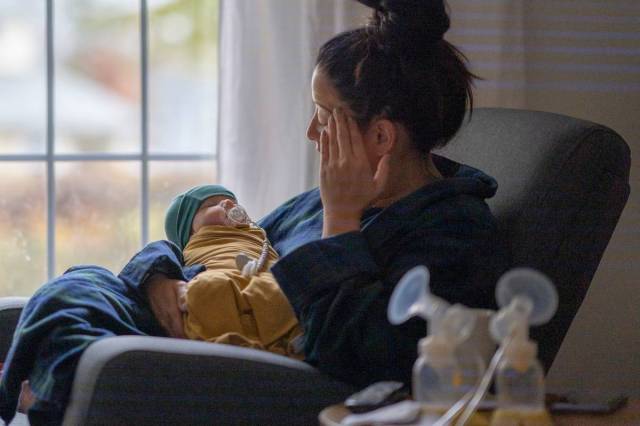A new study out of the University of Michigan School of Nursing has some insightful information regarding new mothers and the pandemic. From February through July 2020 (i.e. the start of the pandemic), 670 postpartum U.S. patients were surveyed and found to have nearly triple the amount of postpartum depression symptoms than pre-pandemic levels. Shocked? We aren’t.
Titled “Postpartum depression and associated risk factors during the COVID-19 pandemic,” the research is part of larger study called “COVID-19 MAMAS (Maternal Attachment, Mood, Ability, and Support),” a body of work that focuses on pregnancy and postpartum experiences during COVID.
All in all, one in three new mothers screened positive for postpartum depression and one in five had major depressive symptoms. Lead author of the study and assistant professor of nursing at U-M, Clayton Shuman noted: “We also found that almost 1 in 5 participants who screened positive for postpartum depression reported having thoughts of harming themselves. This is very concerning given that prior to the pandemic, Dr. Lindsay Admon and colleagues from U-M found the rate of suicidality among prenatal and postpartum patients is on the rise in the U.S.”

photo: iStock
The study found more factors that led to a positive screen of postpartum depression. Formula moms were 92% more likely to experience postpartum depression and were 73% more inclined to have major depressive symptoms than those who breastfed.
Shuman believes a lack of breastfeeding support resources during early COVID may have been stressful so moms switched to switch to formula, only to experience supply chain problems like formula shortages. Additionally, studies have shown that breastfeeding has the potential to protect against postpartum depression.

photo: iStock
Unsurprisingly, moms of NICU babies and those worried about contracting COVID were more likely to screen positive, by 74% and 71% respectively.
According to Shuman, screening is merely the first tool in the process of aiding moms. “Treatment is pivotal to recovery. Resources and education about postpartum depression must be better disseminated and implemented. These resources should be shared with the general public to reduce stigma, and shared with those who provide social and emotional support to postpartum patients, such as partners and family members.”
RELATED STORIES
The Key Ingredient to Better Moods & Sleep While Pregnant
The Most Common Misconceptions about Getting Pregnant
The Banned List: What Not to Do While Pregnant











